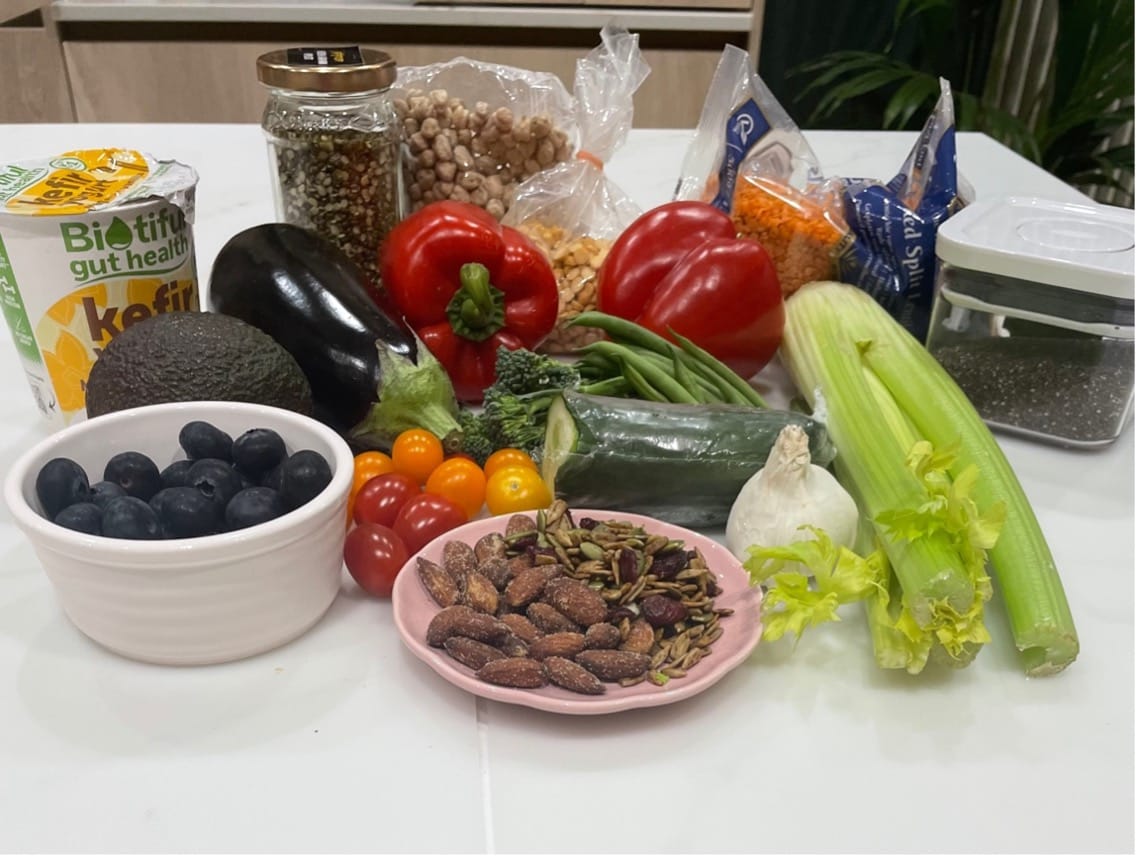NUTRITION in Perimenopause & Menopause
Theme: Reducing risk of heart disease with life style changes includes Healthy diet and exercise
Risk of heart disease after menopause increases by 30-40% due to lack of estrogen which causes metabolic changes, weight gain with increase in visceral fat( fat around internal organs like heart , liver, etc) , changes in body shape with increase fat deposition around the middle, insulin resistance and risk of diabetes, high cholesterol, high blood pressure and symptoms which makes doing exercise and making healthy choices harder.
In women who are overweight ie BMI >25 or obese ie BMI of >30, reduce daily calorie intake by 500-700 to help with weight loss can be achieved by omitting snacking between meals, eating smaller portions, reducing alcohol, carbohydrate intake and avoiding fruit juices.
Well balanced diet
- Daily recommended intake of vegetables, salads and fruit is 5 portions with 1-2 portions of fruits and rest is vegetables. Avoid eating processed foods.
- Daily Protein intake recommended is 1 gm /kg body weight. Sources: plants, nuts, seeds, legumes- beans peas, lentils, chick peas, soya, fish, chicken, eggs . Reduce intake of lean red meat to once or twice a week .
- Daily carbohydrate intake : 100-120 gms/day with intake of carbs with low GI index foods which keep you full for longer. Such as oats and lentils. Eat carbs with high fibre content such as whole grains, cereals, sweet potatoes and vegetables. Avoid refined sugars such as cakes, sweets, puddings etc . Limiting carb intake does help reduce weight .
- Reduce fat content and choose unsaturated fats and cook with rapeseed oil , rice bran oil , add olive oil instead of coconut oil which is high in saturated fats. Reduce intake of red meat such as steak and lamb .
- Omega 3 fatty acids – 2 portions of oily fish/week is recommended.
- Not more than 30 gms of unsalted nuts/day
- Increase fibre content of food improves gut microbiome- whole grain bread, fibre-rich breakfast cereals without added sugar, and brown rice, bulgar wheat. Oats, whole wheat bread, and legumes such as lentils, chickpeas, and beans are excellent sources of fibre. The daily amount of dietary fibre should be 30–45 g, preferably whole grains.
- Plant foods like soya and lentils are heart healthy
- Prebiotic foods : Fermented foods- Kefir, sauerkraut, kimchi, garlic, onion, leek, asparagus, fennel , artichokes, blueberries improve gut health
- Plant sterols like Bencol reduce cholesterol.
- Daily calcium intake recommended is 800-1000 mg Calcium absorption depends on Vitamin D intake . Best source of calcium is from diet. Refer to International Osteoporosis Foundation website for accessing calcium calculator and information on calcium rich foods at https://www.osteoporosis.foundation/educational-hub/topic/calcium-calculator
- Magnesium is found in spinach, pumpkin seeds , chia seeds, legumes and beans. It is a cofactor for many enzymes and regulates protein synthesis, muscle, nerve function, blood glucose , heart function and bone development
SLEEP
Sleep disturbances are common in peri menopause and menopause.
Tryptophan rich food increases melatonin and improves sleep. e.g Eggs, fish, nuts, cherries, strawberries, linseeds, flaxseeds, sunflower seeds , sesame seeds , cheeses , spirulina, salmon, tuna, turkey breast, shell fish
SUPPLEMENTS
There is no need for supplements other than Vitamin D if you have a well balanced diet with plenty of fruit, vegetables and calcium rich foods.
You can consider taking Calcium, Omega 3,6,9 fatty acids, Magnesium bisglycinate , Zinc ,Co-enzyme Q10 and Biotin supplements .
Please check with your doctor when taking Magnesium supplements if you are on Diuretics, PPIs( Omeprazole) , Bisphosphonates and antibiotics due to drug interactions.
Vitamin D3 requirement is 1000 IU daily
